The Liminal Spaces and Myriad Phases Of Twisted Pine
The Boston quartet exemplifies how scratching a niche can feel so, so good for both themselves, and adventurous (and many even staunchly trad) acoustic roots music fans
Thanks for checking out this text version of the podcast series Southern Songs and Stories! This post is a continuation of our Substack series of posts giving you the scripts of our audio and transcripts of our interviews. To hear the episode, simply search for Southern Songs and Stories on any podcast app, or visit us at southernsongsandstories.com for that and much more.
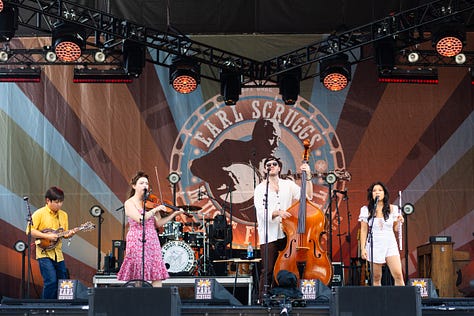
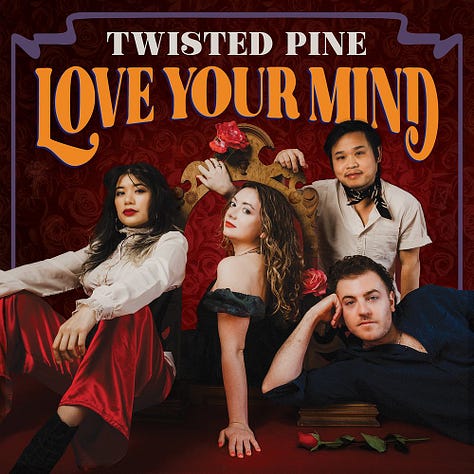
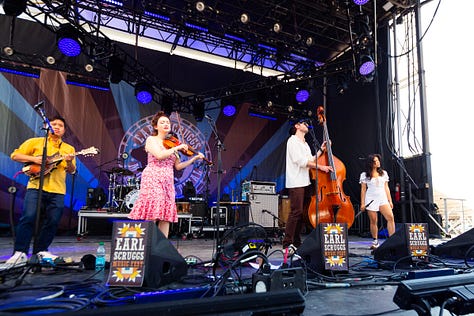
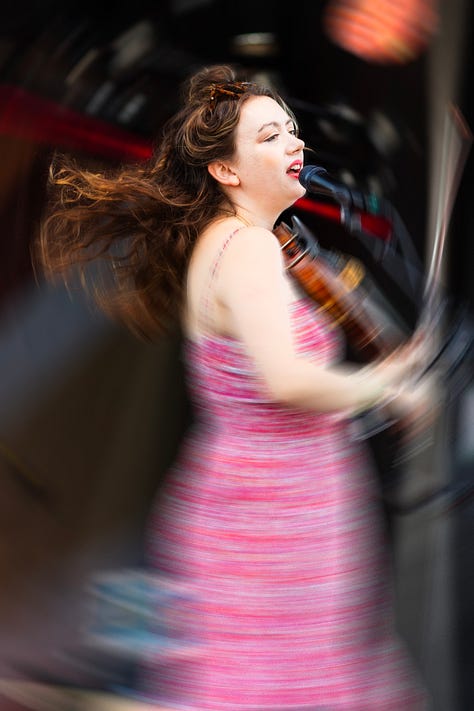
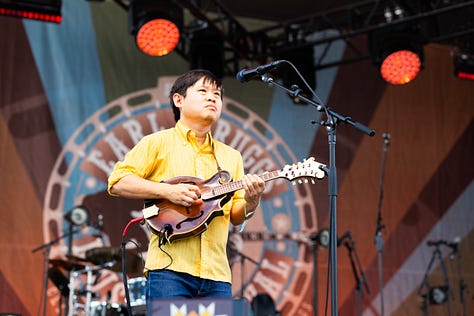

Do you ever have a band sneak up on you, and cross over from the periphery into full focus? Lately, Twisted Pine is that band for me. Going into the Earl Scruggs Music Festival, I had appreciation for the innovative and boundary-pushing acoustic quartet, but I was not all in with their brand of sassy, quirky and groovy “grass” yet. Not quite perched on any one, established branch of the bluegrass tree, Twisted Pine remained a curiosity to me, a band that had potential, but not a spot on the shelf of go-to favorites.
Suffice it to say that I am incredibly glad that I got the band to talk with me, having been fairly well knocked out with their live set at the festival (which this week announced Alison Krauss as a headliner for the 2025 Scruggs Fest, yippee!). Now, their third album Love Your Mind is one of my favorite releases of the year, and should garner them a much higher profile amongst fans of a wide range of acoustic roots music, even those who came of age in a bluegrass scene that would have, not long ago, summarily dismissed Twisted Pine’s music as “no part of nothing.”
And now, the transcript of Twisted Pine’s episode on Southern Songs and Stories, enjoy!
[ “Green Flash (feat. Jerry Douglas)” by Twisted Pine, from Love Your Mind, continuing as bed]
The music business tends to hate the in-between. Finding success there almost always means getting to one (and only one) place which is easily defined: blues, or rock, or jazz, or country, or EDM, or any number of easily identifiable niches within the bins of a record store -- or their more current equivalent, the curated playlists on streaming platforms. Any blurring of these inherently subjective, but nonetheless rigidly established boundaries usually means trouble for an artist, commercially speaking. Making people stop and think of how to describe your music rather than giving them songs that fit into commonly known molds can be the difference between ten people showing up for your performance, or more like a hundred.
While the music business had to have hated having to figure out how to market the Mose Allisons of the world, who was never really blues but also never really jazz, or even the stars like David Bowie or Beck when they made music that veered completely away from their preceding hits, those artists mostly shrugged, and kept following their instinct. And the music world was better off sooner or later, even if it meant shows where only ten people came for a while. Plus it was better for the music business even, since those in-between territories between established musical kingdoms were and are so often incredibly fertile nurseries for nascent sounds and styles.
Thinking about it in a creative sense, the in-between is a crucial ingredient for making music at all. The process of writing and woodshedding and muse conjuring is an inherently liminal state. It is a time where the artist is only waking from the dream, hopefully to remember enough of it once awake, having thoroughly immersed their mind and soul in the quantum state of conjuring a song.
It is a type of trial, a kind of true, final boss to defeat before leveling up to songwriter status, where the artist can be the hero, saving us all from a life with, you know, derivative, formulaic, cliched, or even worse nowadays, AI generated drivel being our only options for music.
Here, we bring you a group who is getting insanely good at scratching a niche. An unlikely quartet in many ways, and a group who has taken a unique approach to the hero's quest of blurring lines and blazing new trails of sound. They can play bluegrass first generation style; they can jump out on any number of limbs that came from that trunk of the tree as well; they can play...Frank Zappa. They have sass and wit, harmonies, hooks and chops all to spare, and ... no guitar, but one very prominent flute, as you can hear in their instrumental playing now, “Green Flash” from their 2024 album, Love Your Mind, which features dobro from Jerry Douglas. They are the band Twisted Pine, and they are our guest on this episode of Southern Songs and Stories.
[SSaS theme intro with VO by Joe K]
Dan Bui, Kathleen Parks, Anh Phung and Chris Sartori are Twisted Pine, and their longtime collaborator Dan Cardinal, who co-produced the album with the band at his studio Dimension Sound in Boston, starts his liner notes by saying, “The music on this record is the most collaborative we’ve recorded yet...”, going on to say that “we’ve spent the years since our last release discovering new truths of ourselves. There’s some pain in that, and energy. Learning to love our minds.”
Dan Cardinal is going back a page in the band’s history to set the stage for his update on where they are now, and he is right, there has been a good bit for the band to overcome -- there’s that hero’s journey again -- and you will hear Anh Phung speak to that in the part of the conversation where we refer back to their preceding album Right Now, released in the midst of the lost year of 2020 amidst the COVID pandemic.
I spoke with the quartet at the 2024 Earl Scruggs Music Festival at the Tryon International Equestrian Center over Labor Day weekend, where they performed for the second straight year. We touched on everything from how the band defines its unique sound, which they describe as their “most expansive ever”, which is saying a lot if you know anything about how they sounded already. We touch on the liminal space they find themselves in musically, with all of its pitfalls and potential, playing live with Swiss Army Knife fiddler and pedal master, Casey Driessen, and much more straight ahead. As always, there is lots of music mixed in, with several more songs from their third album Love Your Mind still to come.
[“Peaches en Regalia” by Twisted Pine, from Love Your Mind, excerpt]
A bit of Twisted Pine’s version of Frank Zappa’s “Peaches en Regalia” from their album Love Your Mind here on Southern Songs and Stories, as we begin our time with the band at the beginning of our conversation, which begins with my question about how to wrap our heads around what goes on in their music. Here is bassist Chris Sartori, followed by lead vocalist and fiddler Kathleen Parks, and mandolinist Dan Bui:
00:00:33 Chris Sartori
That's such a hard question to answer. Because I don't even know if we know. But ultimately, I think fundamentally we're a band that we all have a lot of individual influences, but we all sort of met under the Bluegrass umbrella and have a lot of passion for the music and sort of are rooted there in a lot of ways and sort of like. Progressive bluegrass, Americana.
That's the land that we live in and we're really into like, you know, like what Sierra Hull is doing. And the Punch Brothers. And yeah, there's just, I think, especially now there's like a whole host of musicians and bands that are kind of. In a sort of. Like. More or less uncharted or like yet unnamed Sonic territory. And we are we are squarely there as well. And so our particular brand of music is kind of like. You know, progressive Americana. It's like pretty funky. There's like a lot of elements of, like, indie. Pop. Like, especially songwriting. And so and and also we're like a very. Improv, like a jam heavy band as well. So we kind of wrap all of that up into our little Twisted pine branch.
00:01:51 Joe Kendrick
You got today in your sets. You did everything from The Beatles to Frank Zappa to more traditional material, and a lot of times weaving in and out of, of segueing in the same song. And having bits and pieces of other things going on, which I love and I think I think you work it well. Tell us about how you write your music and and how you come about, you know, settling on what the song is going to be.
00:02:23 Kathleen Parks
Well, let's see. I don't. This is Kathleen, by the way, oftentimes. Our songs start with, you know, either a completed song or a seed of a song, and that is brought to the band. And we start to work on it. We start to see where it's going and we see what a genre almost it wants to live in kind of going off. What Chris said earlier. I would also add that we're just we're very groove based band. So all of our songs really start figuring out what the groove is. And where the pocket is sitting. And like how? Well, like it's and the like. Interesting part. The interesting part about that is, is that we don't have a guitar. So you have all these melody instruments that are getting really rhythmic except for the bass. So Dan is, you know, providing like chop and I'm providing chop on fiddle. Anh providing chop in her in her flute way too. And we kind of like go around trading that back and forth. So with the songwriting process, it's very much like you figure out what the groove is. Try to like all of our melodies. I try to write really vibrant. Memorable melodies, as best I can and I feel like that's kind of where the songwriting starts. And then with shows we see how the audience reacts to it. We like even get our audience involved in the writing process a bit just because we like see their reactions or like. Like try to pick up on like what they seem to like about us. Something like that. So that's like a little bit of where the songwriting starts.
00:04:17 Dan Bui
Yeah. And maybe just to add on to that, like you know it's it's kind of it's it's very song driven kind of all of our choices. We don't we don't decide that we're going to pursue a certain thing until we find a song where it really kind of calls for it. So and so it's just kind of like as we continue to write songs and like and and do covers like you were mentioning, you know, The Beatles and Zappa and stuff. As we continue to incorporate all of that kind of stuff, that's kind of what's leading. All of the kind of eclectic. Different sounds and ways of playing together. It's kind of based. On. Like you know what song we're doing at the time and and like what it makes sense for and. And so in some ways, it's that. That's what makes it so eclectic, you know.
[“Goosebump Feeling” by Twisted Pine, from Love Your Mind, excerpt]
With all four band members sharing writing credit here, that is a bit of “Goosebump Feeling” by Twisted Pine, from their collection Love Your Mind. Our conversation continues with my observation about how they seem to be doing quite well despite what seems like a highly unusual configuration for a traditional bluegrass context like many of the festivals they have played. I asked how it was for Twisted Pine to gain acceptance from that wing of the roots world fanbase. Here is flautist Anh Phung, followed by Chris Sartori, Kathleen Parks, and Dan Bui:
00:06:27 Anh Phung
Well, I think that's actually an interesting question because this this band started as a bluegrass festival. So in in a way we had our foot in the door already for just I think the general public knowing us as a bluegrass band and slowly we've progressed out of that honestly and I think we're still actually quite accepted at the Bluegrass festivals and where we actually feel like we want to explore and expand more is playing other types of festivals because I think we actually fall under some other categories as well. So we've actually started dabbling in jazz festivals and just other, you know, other types of music festivals that house different sort of genres or like just general ones and. So yeah, I think the fact. We are mostly playing bluegrass festivals just because the band is so rooted there and our rep is, you know, rooted in bluegrass. But we're actually kind of trying to expand, you know, the the horizon of where we where we sit.
00:07:34 Chris Sartori
Yeah, I I that's a really interesting question because I think that's definitely true and is saying. But I also think conversely it, it does feel like a unique challenge to be a band like us because. So often people don't know what to do with us? You know or like we exist in this kind of like. It's almost it almost feels liminal, or like people just don't know where to place us, and I think that.
That it takes longer for a band like that to to sort of like, get rooted and get traction behind it because there isn't the the road hasn't been cleared yet in the same way, whereas if you're like, you know, a a traditional bluegrass band or like people can. You know instantly put a title and a name on you. Then there's like a lane that you know that you can follow, whereas we are kind of like charting our own course. And I think there. Is. There can be this sort of like unique type of friction for bands like us in that way.
00:08:37 Kathleen Parks
I would also add I think. One reason why we have been in this Americana bluegrass world for as long as we've been, which is a lovely place to be. We love we we've all like studied this music in our own ways. And so like you mentioned. Earlier about our set, how we like do have a little bit of tradition then we like make the jump and plays Zappa and then play our own songs. We do love this traditional music. We love like those grooves are very much in the sound and have inspired some of the songwriting as well to pay homage to. We love. The greats and play those some of those traditional songs for our audience in our own way, because we know they'll like the song and it also help us connect to them as well, which that's. What we want to be doing so and at the end, usually at the end of a set, people are. Like. We like get. It's really nice to talk to the fans afterwards because like I didn't know what I was gonna see today. But I'm so glad I came, you know? And it's like, that's what keeps, you know, the trajectory going which has been really nice.
[jump to]
00:10:56 Joe Kendrick
I think on your website Love Your Mind, your forthcoming album, is described as a more expansive sound than ever. And. That's saying a lot based on what I already know about Twisted Pine. So give us some insight into Love Your Mind.
00:11:15 Dan Bui
Yeah, I mean, you know, in some ways, love your mind is the first record that we really as a four piece as this configuration really have been able to put out with the benefit of having spent a few years together. Being being out on the road and kind of just all of the songs kind of bear out of that experience and time together, you know, the last couple of years since our last record was in 2020. So in that time we've been, you know, out there a lot like you said and and yeah, it's kind of it's just that that's kind of the sound of love and it's it has it's a more collaborative writing process and like our other albums and in that way it kind of has its own, like, eclecticism, you know, but also it's like kind of. Sometimes, like we also with this album we we try to like kind of pare down and really just get to the heart of some of the songs. So try to be a little more concise on on some songs and some songs more expansive and. Some songs you know, kind of like, oh, maybe this one doesn't need to be super eclectic or complicated or or fancy or anything. It just. It's just a straightforward song and we just try to make it as good as we can. So kind of all of that kind of stuff. Kind of goes into this album and and it's like it's a very rich, it feels very rich for us. You know, having made it and like there's a story behind every song and. Yeah. And so we. Just that's that's kind of, yeah. How we got to that one got to that point.
00:12:48 Chris Sartori
I think in a way it's also our most cohesive record, even though it's quite experimental, I think there is a sort of like settling that happened in the recording of this. This most recent record that feels like. We're we're happy with the way it represents us.
00:13:10 Kathleen Parks
Yeah, it almost feels like. Throughout our time of touring and playing together. The way we talk about how we genre hop, I feel like on this record when we genre hop, we do it completely as a unit and like in that genre, it feels very like we're very we're working together very much like glue, so that the listener doesn't have to do any guessing about what they're listening to, they're just listening to it and enjoying it, and I feel like that feels really exciting. And yeah, we just, I feel like we're like really finding our sound.
00:13:49 Joe Kendrick
I would much rather release a record in 2024 than 2020. So how much of A bummer was it to have that 2020 COVID and everything? And then you've got a new record. How did that affect?
00:14:01 Anh Phung
Well, it was funny for me because I had literally just joined the band. And we went into the studio thinking we're going to, you know, well, we did record a record with like, this new formation with me on flute. And COVID was hitting. And I remember Justin Trudeau's wife got COVID. And I was like, I better just skedaddle because they're going to close the borders.
00:14:26 Chris Sartori
Yeah, we were literally in the studio, like mixing the record.
00:14:29 Anh Phung
Yeah, and it was the last day of recording. You know, like, I I'm just gonna leave you guys. So, you know, I think I I did get all my parts. Down I submitted all my parts. To the class, but it was tough and then you know because. Technically, you know when you look at it on paper, we've been a band like this for five years, but there was a few years in there where we weren't actually playing, but we were collaborating from different countries. So I was in Canada. And we had a lot of experimental kind of projects going where we would use like green screen to the green screen, me into the band, like having like online videos. And then we actually did a show at the border for our album release. There was a spot. I guess it's in, in Vermont and Quebec -- Derby Line. That's right. And there's just kind of a row.
00:15:26 Chris Sartori
Yeah. Vermont.
00:15:29 Anh Phung
Full of potted plants there. So there's not much of A border, so I just stood on one side and the three of them stood on the other side. We had camera people on both sides. We filmed a little concert and it's actually on YouTube.
00:15:40 Chris Sartori
Yeah, we had like a little mic set up and yeah, that was our record release. We also did a second. We did like a live stream. And and also I should say we almost didn't release the record, but I think it was the consensus, like. At the time where we felt like people just needed something, and I think it was also good for us to just, you know, like let's just see what we can do here and like, use the limitations to work creatively. So that was like 1 crazy idea was the border idea. But the other thing that we did was a live stream where the three of us, Dan, Kat and I went to a venue out in Northampton where a record label is based and we filmed a set of music just as a trio, but we left space for where Anh would be. And then we sent it to Anh and like she was saying about the green screen, she recorded herself playing with us. And then we pieced them together, and it was quite seamlessly. You can't really, actually tell.
Still to come, more crazy ideas that paid off for Twisted Pine. Maybe even crazier than staying up after midnight on a regular basis.
[“After Midnight (Nothing Good Happens)” by Twisted Pine, from Love Your Mind, excerpt]
Perhaps they are oversharing, but I find it hilarious; that is an excerpt of “After Midnight (Nothing Good Happens” by Twisted Pine from their album Love Your Mind, leading us towards the conclusion of our time with the band at Scruggs Fest. The Earl Scruggs Music Festival is a weekend long celebration of the music and legacy of the event’s namesake, and as a rule, is ripe with on-stage collaborations. Festival host Jerry Douglas, for example, is all over both stages all weekend, playing in his own Flatt & Scruggs tribute band The Earls of Leicester, playing solo, and playing with any number of other artists. Another artist who could legit sport a “plays well with others” tattoo is Casey Driessen, the Grammy nominated fiddle wizard, whose all-star pickup band dubbed Casey Driessen’s Red Shoe Stringjam wrapped up the festival with one of its most well received performances. Casey played with Twisted Pine during their set as well, and we pick up here with my question asking whose idea it was to bring him on with them:
00:17:16 Kathleen Parks
Well, you know, I actually got to hang out with Casey Driessen for the first time, like this summer at the Mike Block string camp where we both were, I was teaching and and Casey was doing some master classes there and I was down in Florida and then again I saw him at Grey Fox Bluegrass Festival and we did shot. A little video there of like some. Triple fiddle actually with Darol Anger as well. And so I, you know, I was like, I don't even know who set that up, but I'm so glad that they did that.
00:17:55 Chris Sartori
Think I think we got to shout out our manager here. Lynn.
00:17:58 Kathleen Parks
Yeah, Lynn.
00:17:58 Chris Sartori
Bertrand, who also had the idea of she always has the crazy ideas, and she was the one who was like, you guys should drive to the border and do a set there.
00:18:06 Kathleen Parks
Yeah.
00:18:06 Chris Sartori
And you're like, really? Yeah. So yeah, I think it was Lynn's or I think Lynn had. The idea and. Set it up, but Kathleen had that connection.
00:18:12 Kathleen Parks
And we've just been so busy that I, you know, just a couple days ago that I was like ohh Casey's gonna be sitting in with us. This is fantastic. Honestly. It's like a great reason to finally see your other musician friends at festivals, cause you're usually both so busy that like, you're just passing each other by the whole day. So it was great to play three songs with him and. He just brought his magic like to all of the songs and yeah.
00:18:36 Chris Sartori
He was such a good fit. I hope we get to just do that.
00:18:38 Anh Phung
Yeah.
00:18:38 Kathleen Parks
Yeah, it was epic and I love. I feel like we're like some people call us like a. Bluegrass string band, vibe sometimes, but like that also like brought the strings to the next level.
00:18:53 Anh Phung
Also, the pedals like we're such pedal heads in this band, and Casey also is and I think I mean even before the set like he was showing me his power supply because we we got on that conversation. But I think that that's like another thing that.
00:19:07 Chris Sartori
That's a special level of nerdom is the power supply, yeah.
00:19:09 Anh Phung
Yeah, the power supply is the next level for sure, but I I was having a nice chat with Casey.
[“Lonestar” by Twisted Pine, from Love Your Mind, continuing as bed]
Wending our way to the end of this episode on Twisted Pine with another new song from Love Your Mind, the song “Lonestar”, where the quartet finds their way to heaven on a metaphorical Greyhound bus.
Thank you for listening! We are thankful you are here, and for spreading awareness of this endeavor. It is as easy as telling a friend and following this podcast on your platform of choice. From there it takes just a moment to give us a top rating, and where it is an option, a review! It makes a big difference because the more top reviews and ratings we get, the more visible we become to everyone on those platforms, which means that more people just like you will connect with artists like Twisted Pine, Casey Driessen, Jerry Douglas and hundreds, literally hundreds more we have profiled there at your fingertips. Speaking of Jerry Douglas, his episode from 2021 stands the test of time, and you can find that by looking up “It’s Always Roots Music 12 O’Clock With Jerry Douglas” on southernsongsandstories.com, as well as the search feature on your podcast platform of choice. Still to come in the series are artists interviewed at Scruggs Fest and at the last IBMA held in Raleigh, and I know you won’t want to miss those conversations with Lindsay Lou, The Faux Paws, Unspoken Tradition’s Ty Gilpin, author David Menconi and banjo innovator Tray Wellington.
This series is a part of the lineup of both public radio WNCW and Osiris Media, with all of the Osiris shows available at osirispod.com. You can also hear new episodes on Bluegrass Planet Radio at bluegrassplanetradio.com. Thanks to everyone at the Tryon Equestrian Center and the Earl Scruggs Festival for their hospitality, and to Jaclyn Anthony for producing the radio adaptations of this series on public radio WNCW, where we worked with Joshua Meng who wrote and performed our theme songs. I am your host and producer Joe Kendrick, and this is Southern Songs and Stories: the music of the South and the artists who make it.




Good one. Thank you, Joe.